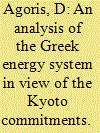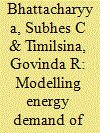| Srl | Item |
| 1 |
ID:
053159


|
|
|
| 2 |
ID:
094898


|
|
|
|
|
| Publication |
2010.
|
| Summary/Abstract |
This paper critically reviews existing energy demand forecasting methodologies highlighting the methodological diversities and developments over the past four decades in order to investigate whether the existing energy demand models are appropriate for capturing the specific features of developing countries. The study finds that two types of approaches, econometric and end-use accounting, are commonly used in the existing energy demand models. Although energy demand models have greatly evolved since the early seventies, key issues such as the poor-rich and urban-rural divides, traditional energy resources and differentiation between commercial and non-commercial energy commodities are often poorly reflected in these models. While the end-use energy accounting models with detailed sectoral representations produce more realistic projections as compared to the econometric models, they still suffer from huge data deficiencies especially in developing countries. Development and maintenance of more detailed energy databases, further development of models to better reflect developing country context and institutionalizing the modelling capacity in developing countries are the key requirements for energy demand modelling to deliver richer and more reliable input to policy formulation in developing countries.
|
|
|
|
|
|
|
|
|
|
|
|
|
|
|
|
| 3 |
ID:
068410


|
|
|
| 4 |
ID:
149908


|
|
|
|
|
| Summary/Abstract |
Among the various alternatives available to reduce greenhouse gas (GHG) emissions, carbon capture and storage (CCS) is considered to be a prospective technology that could both improve economic growth and meet GHG emission reduction targets. Despite the importance of CCS, however, studies of technology and demand forecasting for CCS are scarce. This study bridges this gap in the body of knowledge on this topic by forecasting CCS technology and demand based on an integrated model. For technology forecasting, a logistic model and patent network analysis are used to compare the competitiveness of CCS technology for selected countries. For demand forecasting, a competition diffusion model is adopted to consider competition among renewable energies and forecast demand. The results show that the number of patent applications for CCS technology will increase to 16,156 worldwide and to 4,790 in Korea by 2025. We also find that the United States has the most competitive CCS technology followed by Korea and France. Moreover, about 5 million tCO2e of GHG will be reduced by 2040 if CCS technology is adopted in Korea after 2020.
|
|
|
|
|
|
|
|
|
|
|
|
|
|
|
|